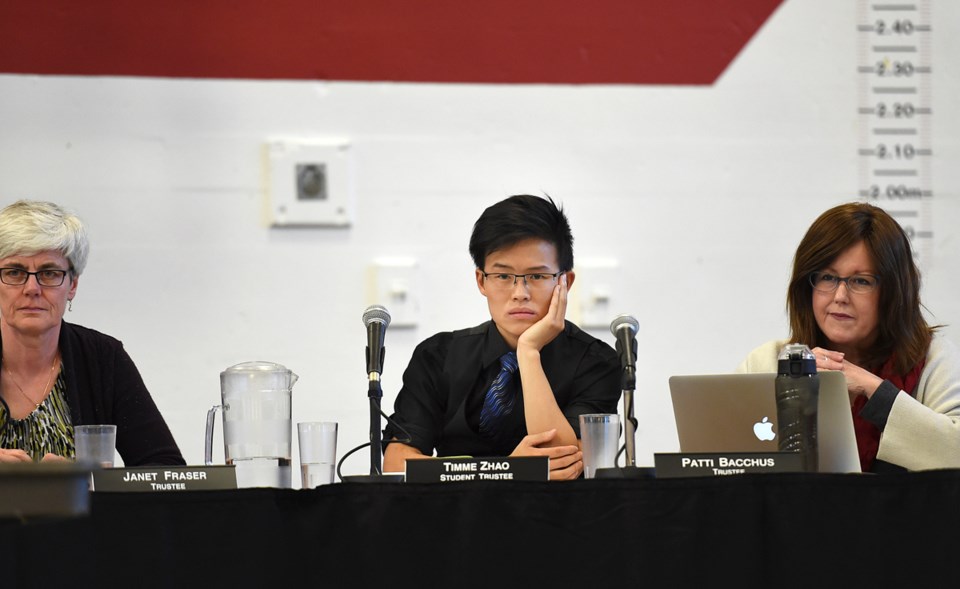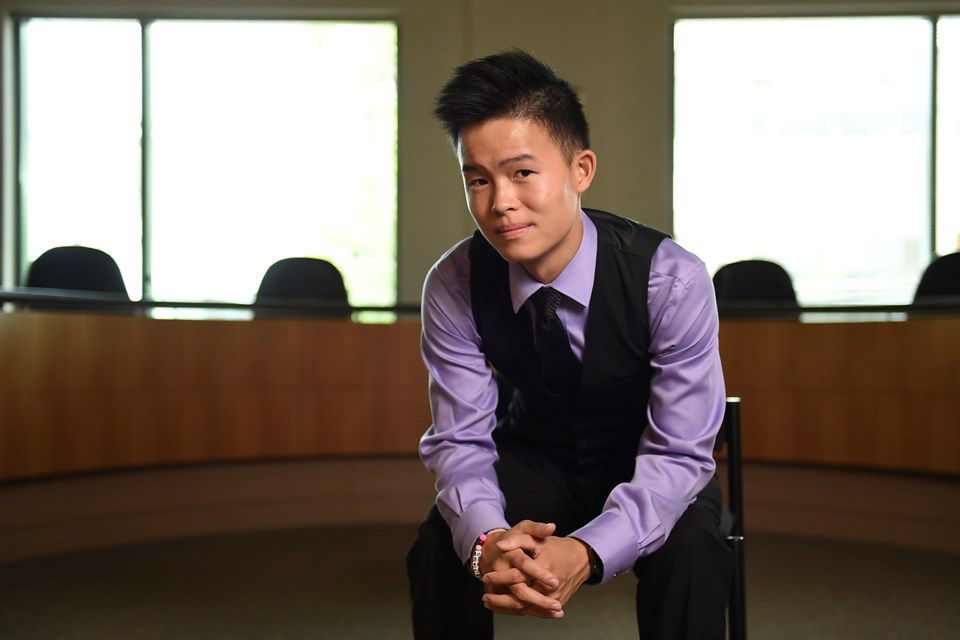Student trustee Timme Zhao has given the city’s student body a voice at the Vancouver School Board for the past year, weighing in on hot-button issues such as the 2016-17 operating budget, which the board rejected April 28, and the proximity of marijuana dispensaries to schools. As the graduating Britannia secondary student prepares to hand the role over to incumbent Isabella Preite from Kitsilano secondary, he reflected on the role of the student trustee, the lessons he’s learned and the need for student input into decisions.
What were your expectations going into the job as student trustee?
I didn’t have any expectations because my predecessor didn’t tell me much about the position. I guess she thought it would be better if I just went into it with a clear mind of what I wanted to accomplish. I didn’t expect much, but what I really wanted to do was fight for what students should have — things like better structures for their buildings — and I really wanted to fight for the LGBTQ situation and get some [gender] neutral washrooms into schools. I didn’t expect much, I wanted to do a lot, but I didn’t really know what [specifically] at that point because I had this huge position and I didn’t know what I could do with that much power.
What is your level of involvement in decision-making at the VSB?
I started right at the very beginning of the year very passionate about student politics and I’ve always fought very hard for student advocacy. At the board, because of how strongly I debate about student issues, I’ve developed quite a reputation and whenever I say something about a specific issue or a motion I think that the other trustees do think about my comments. They’ve always given me really good feedback and they say that what I say really does impact their decisions. I personally can’t vote on the board, but if we’re talking about how much influence I have in the meetings, sometimes what I say kind of changes the motion of the whole discussion. If I felt I had no impact, I’d really question why we have a student trustee. It’s always good to have the students’ perspective whenever you try and make decisions.
Do adults value students’ input?
They’re trying to get more student involvement in the discussion and the student trustee does help a lot because it [bridges] from the student level all the way up to the trustee level and the people that make the decisions. Adults are valuing students’ [opinions] more. However, whenever staff and teachers and the trustees talk about “we’re doing this for the students,” I always speak up. Students are so different, they range so much, and sometimes adults don’t really realize that, you know? It’s just that when they say, “we’re doing what’s best for students,” sometimes I disagree with that. But I do think that once students get more involved and they give more of a clear sense of what’s going on from a students’ perspective, then adults will realize what’s really going on.
What can students do to get more involved?
Well, that comes with the trust that comes from adults. If teachers and staff don’t look at students as a source of information, then we’ll be meaningless when it comes to politics. Nowadays, it’s becoming [easier] for students to give information to the school board. They’ve developed many ways to do this, [such as] implementing the student trustee, having the VDSC [Vancouver District Student’s Council] around, [and] whenever there’s a big project going on at the board they always, always ask for students to come and attend and give input. I think that’s a great way to get student input and start developing that sort of student awareness. Eventually, I’m sure that they’ll let the student trustee vote. There’s going to be a point because I know that in Toronto and in other districts around Canada, you have student trustees that can vote.
(Note: Since 2009, student trustees in Ontario have been entitled to request a recorded vote on any matter before a board or any of its committees. However, since student trustees are not technically board members, the vote is non-binding. All binding votes exclude the student trustee.)
So when they put out that call for student input, does it work?
Definitely. For example, for the strategic plan they asked for a lot of student input and they approached the VDSC for that kind of council. We have designated reps for every [VSB] committee…and they give a brief summary of what went on at that meeting at our district council meetings. So it’s spreading a lot of awareness of what’s going on at the board, especially for students.
What is the student take on the VSB budget and education funding?
As a student that knows what’s happening at the board, I understand why they’re cutting so much. But honestly, I can’t say that that’s the student perspective because I’m very involved at the trustee level. If you’re a regular student it would be very difficult to understand why they’d cut $24 million dollars. I think that this [budget] proposal’s completely unreasonable. It’s systemic. How did we get to this $24 million [shortfall]? It’s not like we started from zero and the next year we were at 24. It’s been an ongoing thing since 2002. Even in previous years when [trustees would] say this is cut and this is cut, there [would be] a little bit of outrage from the public, the trustees [wouldn’t] do much and life goes on. This year it’s different because the trustees realized that we’re hitting our limits [and] we can’t cut anymore. It’s taken 14 years to finally decide to vote against [proposed cuts]. There’s not much I can do at this point really [other than] just trust the trustees to do what they think is right. [Note, the shortfall is now $21.8 million]

VSB trustees often refer to Vancouver as having a “world-class education system.” What does that look like from a student’s perspective?
That’s very difficult to say because I personally don’t know the numbers and how much they’re putting in to different parts of the education system. Honestly, the system hasn’t really changed much since I’ve been in high school. I don’t know how much better we can be because I don’t know what that looks like. For me, if the whole system was to stay the way it was for the last five years of my high school, I’d be proud of it. I’m sure there could be ways of improving my years, but I couldn’t say what with confidence. I can say that my five years of high school have prepared me extremely well for life. I’ve been to other schools around the world. I’ve stayed in Japan for a couple of weeks and attended their high school. I know people from all over the world and I can say with confidence that Vancouver as a district can compete against other districts in the world. A lot of students from Vancouver compete in very high [level] international competitions. No system’s perfect, but to be able to constantly send students to the top universities and have students compete at high [level] competitions around the world, that’s kind of unheard of. I’m pretty proud of my district.
In terms of education-related issues, what are the biggest concerns for students, and what can government do, both at the district and at the provincial level, to address them?
[One] problem that a lot of students have at the school level is getting more power. I was speaking earlier about how students are getting more involved, but at some schools it’s very difficult and students are still not really trusted. Although they are given these opportunities like attending [VSB] committee meetings, there are people out there that don’t trust students. That’s what I’ve tried to focus on this year is showing people that — there are countless other students that can be placed in this position. Students have been getting more involved in politics, but I’m still not satisfied with how much involvement we have. Students should know that their voice matters. The reason why you don’t see many students at these [VSB public input] events is because either they don’t know about it or they don’t really think their voice matters so they don’t attend. I think that mentality has to change, and that comes with giving students more opportunities to get involved. Students are what matter in the end. No matter what decision the trustees make or parents make, it’s going to fall on the students.
What have you learned from your time as a student trustee?
First off, I can say with confidence that politics isn’t what I want to go in to. I love representing students but I couldn’t possibly imagine being one of the trustees and dealing with that on a daily basis. It’s a different responsibility on a different level. I can say that [one] skill I gained was definitely listening to people and being open-minded. It’s kind of reinforced that it’s not about me, it’s about the student that’s being affected, the student that has the complaint. I’ve learned to listen and to really formulate an idea. I'm really proud that I was able to get through it with such professionalism because at the beginning I was just like, 'what's happening?' But now I'm able to sit down, talk to people, understand, be patient and really clear all my biased opinions and just put myself in the other person's shoes and see the issue from their perspective. That's probably the biggest thing I've learned from this whole year.
What is it about politics that makes you not want to go in to it?
Sometimes I feel like [trustees] don’t always vote for what they think is right, but [instead] what they think that their [party] has to vote for. I feel it infringes on one’s own personal beliefs and I don’t think that’s something that I want to do. Also, a lot of people depend on you as a politician, and sometimes you have to decide to vote against what the public thinks is right, and that’s something that I don’t think I would be able to do. I just don’t think I would be able to take the backlash.
What are your plans post graduation?
Originally I was going to travel all over the world — that’s what everyone wants to do — but I decided to go back to school because I got some money and I just didn’t want to take a break. I’ll be going to UBC next year for sciences and I’m hoping to go to med school. I know everyone says they want to become a doctor, but I’ve always been passionate about helping people. That’s why I’ve been so involved in student advocacy, because I care about other people. Becoming a doctor is a way to help a lot of people and know that my work is impacting other people and changing other people’s lives. I guess in a way you can see how those two things are connected.
This interview was edited and condensed
@jameswesmith



